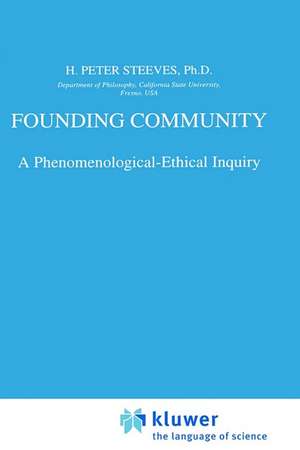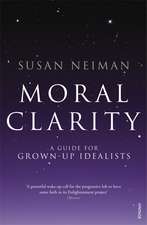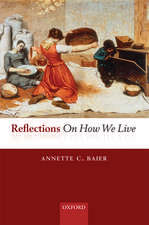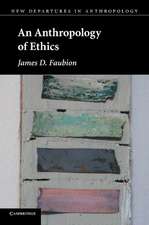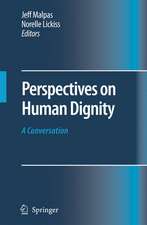Founding Community: A Phenomenological-Ethical Inquiry: Phaenomenologica, cartea 143
Autor H.P. Steevesen Limba Engleză Hardback – 28 feb 1998
| Toate formatele și edițiile | Preț | Express |
|---|---|---|
| Paperback (1) | 634.49 lei 6-8 săpt. | |
| SPRINGER NETHERLANDS – 8 oct 2012 | 634.49 lei 6-8 săpt. | |
| Hardback (1) | 641.38 lei 6-8 săpt. | |
| SPRINGER NETHERLANDS – 28 feb 1998 | 641.38 lei 6-8 săpt. |
Din seria Phaenomenologica
- 20%
 Preț: 816.33 lei
Preț: 816.33 lei - 13%
 Preț: 478.40 lei
Preț: 478.40 lei - 20%
 Preț: 629.12 lei
Preț: 629.12 lei - 13%
 Preț: 491.46 lei
Preț: 491.46 lei - 13%
 Preț: 542.55 lei
Preț: 542.55 lei - 20%
 Preț: 553.67 lei
Preț: 553.67 lei - 15%
 Preț: 633.02 lei
Preț: 633.02 lei -
 Preț: 417.02 lei
Preț: 417.02 lei -
 Preț: 417.90 lei
Preț: 417.90 lei -
 Preț: 418.29 lei
Preț: 418.29 lei -
 Preț: 389.49 lei
Preț: 389.49 lei -
 Preț: 425.42 lei
Preț: 425.42 lei - 15%
 Preț: 577.72 lei
Preț: 577.72 lei - 15%
 Preț: 527.32 lei
Preț: 527.32 lei - 15%
 Preț: 636.80 lei
Preț: 636.80 lei - 18%
 Preț: 952.89 lei
Preț: 952.89 lei - 18%
 Preț: 949.42 lei
Preț: 949.42 lei - 15%
 Preț: 643.65 lei
Preț: 643.65 lei - 18%
 Preț: 1225.48 lei
Preț: 1225.48 lei -
 Preț: 389.31 lei
Preț: 389.31 lei - 18%
 Preț: 1113.39 lei
Preț: 1113.39 lei - 18%
 Preț: 952.40 lei
Preț: 952.40 lei - 18%
 Preț: 1713.67 lei
Preț: 1713.67 lei - 18%
 Preț: 1551.73 lei
Preț: 1551.73 lei - 18%
 Preț: 1222.31 lei
Preț: 1222.31 lei - 18%
 Preț: 944.19 lei
Preț: 944.19 lei - 15%
 Preț: 642.51 lei
Preț: 642.51 lei - 18%
 Preț: 1112.78 lei
Preț: 1112.78 lei - 18%
 Preț: 891.80 lei
Preț: 891.80 lei - 18%
 Preț: 948.47 lei
Preț: 948.47 lei - 18%
 Preț: 1224.18 lei
Preț: 1224.18 lei - 18%
 Preț: 946.87 lei
Preț: 946.87 lei - 15%
 Preț: 578.84 lei
Preț: 578.84 lei - 15%
 Preț: 464.18 lei
Preț: 464.18 lei - 18%
 Preț: 839.56 lei
Preț: 839.56 lei
Preț: 641.38 lei
Preț vechi: 754.56 lei
-15% Nou
Puncte Express: 962
Preț estimativ în valută:
122.72€ • 128.48$ • 101.55£
122.72€ • 128.48$ • 101.55£
Carte tipărită la comandă
Livrare economică 05-19 aprilie
Preluare comenzi: 021 569.72.76
Specificații
ISBN-13: 9780792347989
ISBN-10: 0792347986
Pagini: 161
Ilustrații: X, 161 p.
Dimensiuni: 170 x 244 x 15 mm
Greutate: 0.45 kg
Ediția:1998
Editura: SPRINGER NETHERLANDS
Colecția Springer
Seria Phaenomenologica
Locul publicării:Dordrecht, Netherlands
ISBN-10: 0792347986
Pagini: 161
Ilustrații: X, 161 p.
Dimensiuni: 170 x 244 x 15 mm
Greutate: 0.45 kg
Ediția:1998
Editura: SPRINGER NETHERLANDS
Colecția Springer
Seria Phaenomenologica
Locul publicării:Dordrecht, Netherlands
Public țintă
ResearchCuprins
I: Morality and Phenomenology.- 1. Introduction.- 2. Science, Morality, and Phenomenology.- Notes.- II: The Ego and the Other in a Pairing Relation.- 1. Introduction.- 2. Empathic Perception and the Constitution of the Ego and the Other in Cartesian Meditations.- 3. The Sphere of Ownness.- 4. The Reciprocal Relation of Pairing: Some Problems.- 5. Theunissen and the Question Concerning Pairing.- Notes.- III: Instinct and the Presence of the Other.- 1. The Case for Instinct.- 2. The Other as Unity.- 3. Re-Thinking Infantile Intentionality.- 4. Limitations from a Husserlian Standpoint.- Notes.- IV: Moral Categoriality & Moral Being.- 1. Introduction.- 2. The History of Moral Theory.- 3. Categoriality and Foundations.- 4. Moral Categoriality.- 5. Morality as Choice v. Mode of Being.- 6. Problem: The Unthinking Actor.- 7. Problem: The Non-Judgmental Actor.- 8. Conclusion.- Notes.- V: Phenomenological Communitarianism.- 1. Introduction: The Descriptive and the Normative.- 2. Communitarian Theory in General: Three Problems.- 3. The “Disappearing-Self” Problem.- 4. The “Intersubjective Good” Problem.- 5. The “Constitution of a Community” Problem.- 6. The State of our Union, the Union of our State.- Notes.- VI: Non-Human Life and the Boundaries of Community.- 1. Introduction: A Persian Fable.- 2. Initial Human Pairing with Animals.- 3. “Animal Phenomenology” and the Possibility of Community Generated Without Humans.- 4. The Gracious Act of Attention Late-in-Coming.- 5. Community Through Narrative.- 6. Humans and Animals in a Second-Order Community.- 7. Conclusion: The Common Good as Moral Foundation.- Notes.
